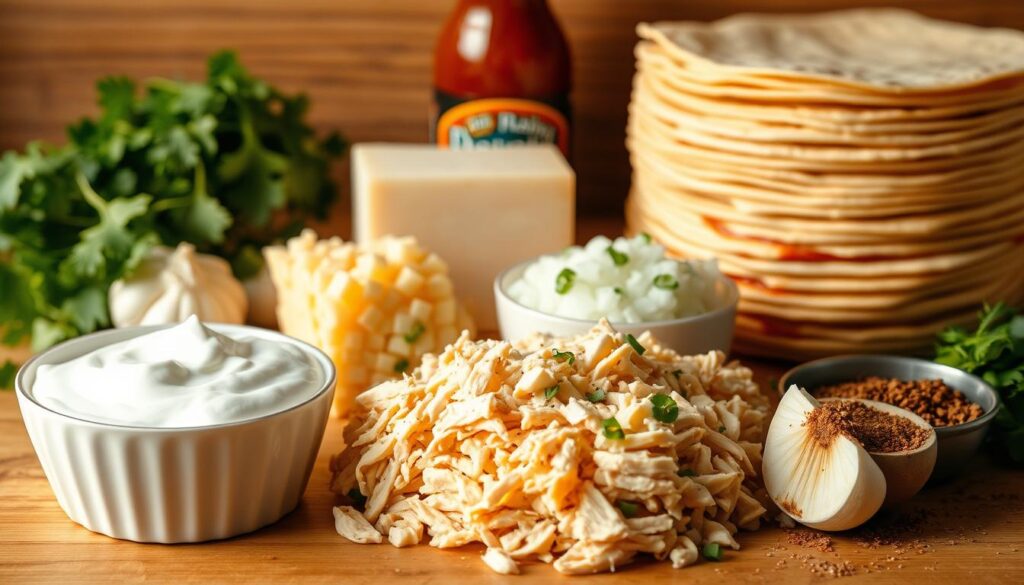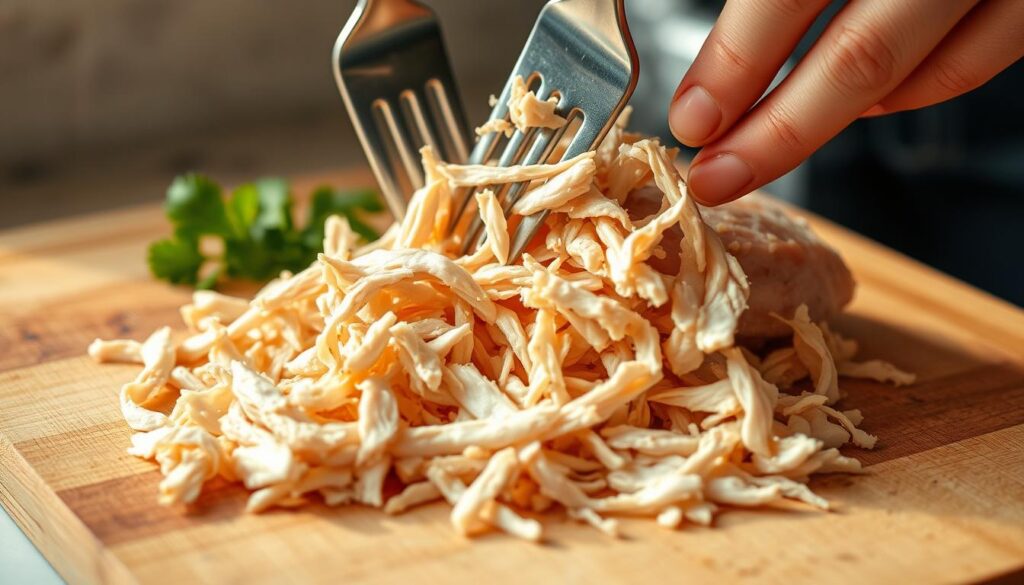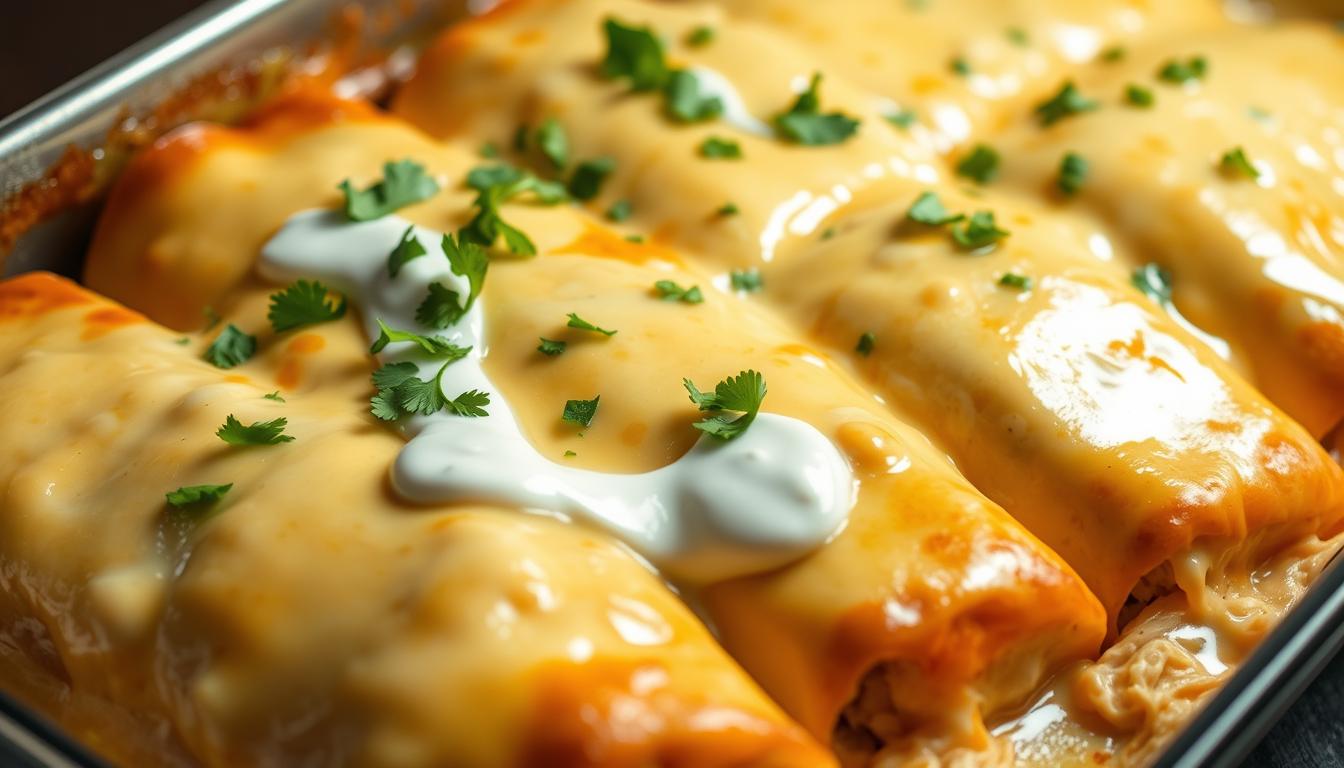Creamy White Chicken Enchilada Recipe – A Comfort Food Favorite
What if you could make a crowd-pleasing dinner that tastes like it took hours to prepare without the hassle? This creamy, satisfying dish has quietly become a staple in kitchens across America—and once you try it, you’ll understand why.
Craving comfort food? Try our white chicken enchilada recipe, featuring tender chicken and creamy sauce, ready in under an hour.
Imagine tender shredded protein wrapped in soft flour tortillas, smothered in a velvety sauce that’s rich but not overwhelming. The secret lies in balancing mild green chiles with melty cheese, creating layers of flavor that appeal to all ages. Unlike traditional versions with bold red sauces, this approach keeps things mellow while delivering serious comfort.
Perfect for busy nights, the meal comes together faster than ordering takeout. You’ll need just seven main ingredients, most likely already in your pantry. The technique focuses on simplicity: no fancy skills required, just straightforward assembly and baking.
Families love how it satisfies even the pickiest eaters. Since 2012, home cooks have praised its reliability—the kind of dish that earns permanent spots in recipe boxes and weekly meal rotations. Ready to discover what makes this version stand out?
Key Takeaways
- Learn why this crowd-pleasing meal works for both weeknights and gatherings
- Discover the ingredient that replaces spicy heat with creamy richness
- Master the quick-prep method that cuts kitchen time in half
- Understand how to adapt the base formula for different dietary needs
- Get insider tips for achieving perfect texture every time
Overview of the Creamy White Chicken Enchilada Recipe
Discover how a simple twist transformed a traditional dish into a modern family favorite. Unlike classic versions that rely on corn tortillas and tomato-based sauces, this iteration swaps bold spices for velvety textures. Let’s unpack why it’s earned its spot in dinner rotations nationwide.
Recipe Background and Inspiration
This dish emerged as a solution for households craving hearty meals without intense heat. By replacing chili-heavy sauces with a buttery roux base, creators achieved a milder profile that still feels indulgent. The technique borrows from Tex-Mex traditions while prioritizing approachable ingredients.
What Makes It a Comfort Food Favorite
Three elements define its appeal: creamy consistency, customizable fillings, and universal flavor balance. Families appreciate how the sauce clings to tender shredded poultry without overpowering younger palates. Its versatility shines through easy ingredient swaps—think turkey or plant-based proteins.
| Feature | Traditional Enchiladas | Modern Twist |
|---|---|---|
| Tortillas | Corn | Flour |
| Sauce Base | Chili peppers | Cream & cheese |
| Flavor Profile | Spicy | Rich & mellow |
Weeknight cooks praise the 45-minute prep time and forgiving nature. Even substitutions—like Greek yogurt instead of sour cream—deliver consistent results. It’s the kind of meal that disappears from plates faster than it leaves the oven.
Essential Ingredients and Their Roles
The magic of this dish lies in its carefully chosen elements. Each component works like puzzle pieces—remove one, and the balance shifts. Let’s explore what makes these elements non-negotiable yet adaptable.

Key Proteins, Cheeses, and Dairy
Shredded cooked poultry forms the hearty core. Whether roasted, boiled, or store-bought rotisserie, it delivers satisfying texture. “The right protein prep method can elevate the entire dish,” notes a Texas-based chef.
Monterey Jack cheese melts seamlessly into sauces and fillings. Its mildness lets other flavors shine. Prefer a kick? Swap in Pepper Jack—the creamy base tames its heat perfectly.
Flour tortillas outshine corn here. Their pliable nature prevents sogginess when baked. Butter and sour cream team up to create a luxe sauce that clings to every fold.
Spices, Seasonings, and Flavor Enhancers
Mild green chiles add subtle zest without overwhelming sensitive palates. They’re the stealth flavor boosters—diced small, distributed evenly.
Adobo seasoning brings depth with paprika and garlic notes. For simpler pantries, salt and pepper work wonders. Want smokiness? A dash of cumin transforms the profile.
Remember: the broth matters. Use low-sodium versions to control salt levels. Every element, from dairy to spices, should harmonize rather than compete.
How to Prepare the Shredded Chicken
Perfectly cooked poultry makes all the difference in your final dish. Let’s break down the best approaches to achieve tender, flavorful results every time—whether you’re meal-prepping or racing against the clock.
Cooking Methods: Oven, Boiling, or Rotisserie
Oven-roasting delivers deep flavor. Rub 4-5 boneless breasts with olive oil, then season with cumin and garlic powder. Bake at 350°F for 30-40 minutes. For quicker options, boil seasoned breasts in broth for 20 minutes.

Slow cooker enthusiasts swear by its hands-off magic. Combine raw poultry with ½ cup water and spices on low heat for 6 hours. Prefer instant results? Rotisserie options from your grocery store eliminate cooking time entirely.
Shredding Techniques for Optimal Texture
Two forks create classic strands ideal for absorbing sauces. “The goal is uniform pieces—not pulverized meat,” advises a Denver-based culinary instructor. For bulk prep, use a stand mixer’s paddle attachment on low speed for 10 seconds.
Season after shredding if using store-bought rotisserie poultry. Toss meat in a bowl with spices like onion powder or smoked paprika to boost flavor. Avoid over-mixing to maintain satisfying texture in every bite.
Selecting and Preparing Your Tortillas
Your choice of wrapper can make or break the dish. While both options work, their handling differs dramatically. Let’s explore how to maximize texture and avoid kitchen frustrations.
Flour vs Corn: Structural Showdown
Flour tortillas bend like gymnasts—no preheating needed. Their smooth surface resists sauce absorption, keeping rolls intact during baking. “They’re the training wheels of Mexican cuisine,” jokes a Phoenix-based cookbook author.
Corn versions demand more finesse. Heat each in a dry skillet for 15 seconds until pliable. Skip this step, and you’ll battle cracks mid-roll. Smaller sizes? They create bite-sized portions but require extra assembly time.
| Feature | Flour | Corn |
|---|---|---|
| Flexibility | Ready-to-roll | Requires heating |
| Sauce Resistance | High | Moderate |
| Prep Time | 0 minutes | 3-5 minutes |
| Flavor Profile | Neutral | Earthy |
| Authenticity Factor | Low | High |
New cooks often choose flour for stress-free rolling. Veterans lean into corn’s rustic charm despite the extra steps. Pro tip: Microwave stacks of 5 corn tortillas between damp paper towels for 45 seconds if short on time.
“Corn tortillas whisper tradition—flour shouts convenience. Your mood decides which voice to follow.”
Crafting the Perfect Creamy White Sauce
The sauce ties everything together—silky texture meets rich flavor in every bite. Nail this element, and your dish transforms from good to unforgettable. Let’s build it layer by layer.
Creating a Roux Base with Butter and Flour
Start by melting butter in a saucepan over medium heat. Whisk in flour immediately to form a golden paste. Cook for 60 seconds, stirring constantly—this removes raw taste while thickening your base.
Watch the color: pale yellow means it’s ready. Too dark? Toss it and restart. This step ensures your sauce won’t taste chalky later. “The roux is your foundation—treat it like one,” advises a Louisiana-trained chef.
Incorporating Sour Cream and Chicken Broth
Gradually pour in broth while whisking vigorously. The mixture will thicken quickly—don’t panic. Reduce heat to low once it resembles gravy. Fold in sour cream until fully blended, creating a velvety texture.
For extra richness, stir shredded Monterey Jack cheese into the warm sauce. Balance the creaminess with diced green chiles for subtle zest. Let simmer for 2-3 minutes before assembling. Your patience rewards you with a sauce that clings perfectly to every ingredient.







